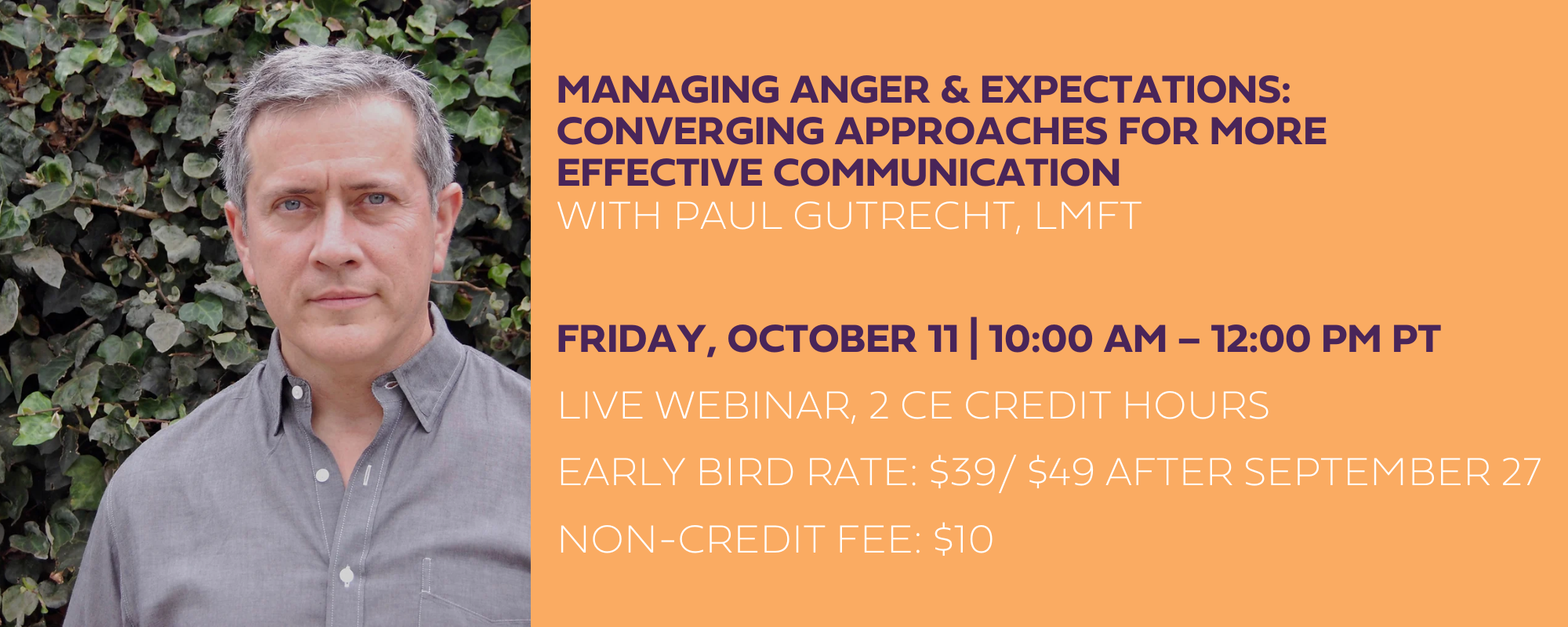
Managing Anger and Expectations: Converging Approaches for More Effective Communication and Improved Mental Health
With Paul Gutrecht, LMFT
Online Only
Description:
In this two-hour workshop, participants will learn 3 different psychological approaches to a set of 4 core elements of basic human communication—facts, cognitions, feelings and wants & needs.
With these approaches as scaffolding, they will develop their own language for presenting these core elements as psychoeducation to their own clients.
Using case studies, Paul will demonstrate ways take apart a client’s escalating language and perspectives and reveal the feelings, wants and needs that are layered underneath.
Participants will also have the opportunity at this point to ask a question or two about the material presented so far as it may relate to one of their clients.
Paul will then teach 7 seven major steps of anger management, first with participants applying these steps to themselves and then as a path to understanding how to share them with clients.
Paul will then address relevant coping skills for two aspects of countertransference: First, how to process and communicate mindfully when the clinician gets activated on behalf of the client, based on the client’s reported content; Second, how to process and communicate mindfully when a clinician experiences feelings of fear based on a client’s expression of anger toward the clinician.
Paul will then conclude with a few more case studies and open up any remaining time to answer any questions.
This webinar is designed to meet the continuing education needs of Psychologists, LMFTs, LCSWs, LPCCs, & LEPs and other mental health professionals.
Cost & Details:
Tuition: Early bird rate: $39.00; $49.00 after September 27.
Non-credit Fee: $10
You also have an opportunity to include a tax-deductable donation to The Maple Couseling Center.
Excluding the cost of the webinar, all amounts donated are tax deductible. The Maple Counseling Center is a tax exempt organization as described in Section 501(c)(3) of the Internal Revenue Code; EIN 95-2753118. Please consult with your tax advisor with any questions.
Class Schedule: Friday, October 11, 2024
10:00 AM
• 3 different psychological approaches to a set of 4 core elements of basic human communication—facts, cognitions, feelings, and wants & needs
• With these approaches as scaffolding, how to develop your own language for presenting these core elements as psychoeducation to your own clients
• Case studies demonstrating ways to take apart a client’s escalating language and perspectives and reveal the feelings, wants, and needs that are layered underneath
• Q&A
10:55 AM
• Break
11:05 AM
• 7 major steps of anger management, first with participants applying these steps to themselves and then as a path to understanding how to share them with clients
• Relevant coping skills for two aspects of countertransference:
• How to process and communicate mindfully when the clinician gets activated
on behalf of the client, based on the client’s reported content
• How to process and communicate mindfully when a clinician experiences
feelings of fear based on a client’s expression of anger toward the clinician
• Case studies
• Q&A
Access: Online via Zoom OR In-Person. For Zoom, the link will be provided to you. Be sure to register using the email address that you use to login to zoom as the link will only work with the specific address you register with.
Attire: Dress comfortably.
Tech Requirements: You will need a stable internet connection and the most recent version of Zoom Client for Meetings (available free here).
Tech Courtesy: We want your experience to be positive, so please:
- Log-in to the session a few minutes early.
- Submit questions via the chat feature.
- Limit chat submissions to workshop topics only.
This webinar offers 2 hours of Continuing Education Credit for LMFTs, LCSWs, LPCCs, & LEPs and is appropriate for all mental health professionals.
Clicking the Register now button will take you into zoom to complete your enrollment and pay your fee. You will be asked to log in to Zoom. Be sure to add “noreply@zoom.com” to your email app’s trusted senders list to assure that confirmation and reminder emails go to your inbox.
You can also register by phone: 310.474.2505
Objectives:
In this interactive program, participants will learn how to:
1. Identify three separate approaches to more effective, structured communication [R1][R4]
2. Outline their individual approach to presenting these three approaches as psycho-education to a client [R1] [R4]
3. Demonstrate resourcing/coping skills for patients to use in real time for managing emotional urges. [R2] [R3][R5]
4. Identify and use mindfulness-based coping skills for managing one’s own reactions (countertransference) to a client. [R2][R5]
Presenter Bio:
Paul Gutrecht, LMFT

Paul Gutrecht, LMFT is certified in Anger Management, intensively trained in DBT (Dialectal Behavior Therapy) and offers EMDR (Eye Movement Desensitization and Reprocessing) Therapy, an evidence-based treatment for dealing with trauma. A graduate of Cornell University, Paul received his Masters in Clinical Psychology from Antioch University and trained at The Maple Counseling Center in Beverly Hills and at Family Service of Santa Monica. Paul was one of a four-person team that opened the Intensive Outpatient Program for CLARE Foundation in Santa Monica, where he then became the Intake Coordinator while working with clients individually and in groups on Anger Management, Communication Skills, 12-Step Facilitation, Family Dynamics and Self-Care. In addition to treating depression, anxiety, addiction, and childhood trauma, Paul has also developed a focus on counseling with couples in conflict, as well as on co-parenting for those who have separated or divorced and are committed to providing the best experience possible for their children. www.PaulgCounseling.com
Disclosure: The Lifespan Learning Institute and The Maple Counseling Center have implemented a process where everyone who is in a position to control the content of any educational activity must disclose any potentially relevant financial relationship with a commercial interest. The presenter listed above have been determined to be free of conflict for the purposes of this workshop.
Continuing Education Credit:
Continuing Education Credit: The Lifespan Learning Institute and Maple Counseling are cosponsors of this Continuing Education program.
CE Provider Approval Statement: Lifespan Learning Institute (Provider # 050085) is approved by the California Association of Marriage and FamilyTherapists to sponsor continuing education for LMFTs, LCSWs, LPCCs, & LEPs. Lifespan Learning Institute maintains responsibility for this program/course and its content.
Credit statement: Course meets the qualifications for 2 hours of continuing education credit for LMFT’s,LCSW’s, LPCC’s and LEP’s as required by the California Board of Behavioral Science.
Target Audience: This webinar is designed to enhance the skills of master’s level clinicians working with individuals, couples and groups, and will benefit most mental health professionals of all levels.
Course Completion Certificates: Awarded at the end of the course in exchange for a completed evaluation form. (Or successful completion of an online test and a completed evaluation form)
Communications: All pre-conference and post-conference communications will be via email or online. This includes but is not limited to: Registration confirmation, digital syllabus, Evaluations, CE certificates, etc.
Cancellations and Refunds: If Lifespan Learning Institute cancels or postpones a program, a full refund will be issued. If you need to cancel: Cancellation must be made in writing (by mail or by email) and received by Lifespan Learning Institute at least 10 days prior to the first date of the program. All cancellations are subject to a 20% cancellation fee.
Grievance Policy: Lifespan Learning Institute is fully committed to conducting all activities in strict conformance with the Ethical Principles of the APA & CAMFT. The full policy and filing procedure are available at LifespanLearn.org
Students with Disabilities: In accordance with the American with Disability Act (ADA), please contact our office (310.474.2505) at least 2 weeks before the program if you need special accommodations.
Sponsors:

The mission of Maple Counseling is to provide low-cost comprehensive mental health services to individuals of all ages, couples, and families, and to provide training for graduate and postgraduate students who are working towards licensure in the mental health field. Since its inception, in 1972, Maple Counseling has helped over 300,000 people receive critical mental health service. Maple Counseling provides programs and services to people of all ages, annually servicing over 7,700 individuals throughout all areas of Los Angeles County, and expanding to support all of California via telehealth. Maple offers ongoing counseling services in a safe space for adults through individual, couples, and group sessions, as well as to children, teens, and families, and provides psychiatric services through the Kapelovitz Psychiatry Program for eligible clients. In addition, Maple Counseling offers several community-based programs onsite at various schools including Community Circle, The Ted and Hedy Orden & Family Community-Based Preschool Mental Health Program, and School-Based Counseling Services that serve over 1,600 students a year.

